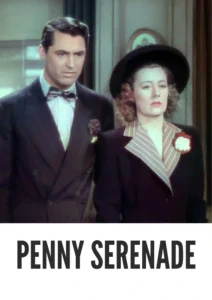Contact: info@alwanfilm.com
Video Sources 0 Views
- Watch trailer
- Penny Serenade


Synopsis
Table of Contents
ToggleReview: Penny Serenade 1941 Colorized – A Heartfelt Melodrama of Love and Loss

Introduction
Penny Serenade, released in 1941, is a poignant melodrama directed by George Stevens. Renowned for its emotional depth, powerful performances, and timeless themes, this classic film continues to resonate with audiences for its exploration of love, loss, and the enduring power of hope. In this review, we’ll delve into the heartfelt world of Penny Serenade and its lasting impact on cinema.
Check The Full Colorized Movies List
Check Our Colorized Movies Trailer Channel
Understanding Penny Serenade 1941 Colorized: Director, Cast, and Genre
Directed by George Stevens, Penny Serenade features a talented cast led by Cary Grant and Irene Dunne. The film belongs to the melodrama genre, known for its emotional intensity, romantic themes, and sentimental storytelling.
Exploring the World of Penny Serenade 1941 Colorized: Plot and Characters
Penny Serenade follows the journey of a young couple, Roger and Julie Adams, as they navigate the joys and sorrows of marriage. Through a series of flashbacks triggered by old records, Julie reflects on the challenges they faced, including infertility, financial struggles, and personal tragedies. As their love is tested by adversity, they discover the true meaning of commitment, sacrifice, and forgiveness.
The Art of Film Colorization
While Penny Serenade was originally filmed in black and white, its early colorized version adds a new layer of emotional depth to its heartfelt storytelling. The colorization process enhances the film’s nostalgic appeal and captures the warmth and intimacy of its romantic scenes with striking clarity.
Early Colored Films: A Brief History
The history of early colored films is marked by innovation and experimentation as filmmakers sought to enhance the visual appeal of their movies. From hand-tinted frames to pioneering technicolor processes, the evolution of colorization techniques transformed the cinematic landscape, offering audiences a new way to experience the beauty and emotion of melodramas like Penny Serenade.
Penny Serenade (1941) and Its Early Colored Version
The decision to release Penny Serenade in a colorized format was made with the intention of immersing audiences in the nostalgic beauty of its romantic storyline and enhancing the film’s emotional impact. While some purists may prefer the original black and white version, the early colorized edition of Penny Serenade adds a new layer of emotional depth to its heartfelt storytelling and captures the timeless appeal of its romantic themes with breathtaking clarity.
The Debate Over Film Colorization
The debate over film colorization continues to divide audiences and industry professionals alike. While some argue that colorization breathes new life into classic films and makes them more accessible to modern audiences, others maintain that it compromises the artistic integrity of the original work. As technology advances and filmmaking techniques evolve, the debate over colorization remains a topic of ongoing discussion within the film community.
Examining Penny Serenade (1941) as an Early Colored Film
Viewing Penny Serenade in its early colorized iteration offers audiences a fresh perspective on its heartfelt storytelling and emotional resonance. The colorization process enhances the film’s nostalgic appeal and captures the warmth and intimacy of its romantic scenes with stunning clarity. As viewers are swept away by the timeless love story of Roger and Julie, they are treated to a visual feast that immerses them in the beauty and emotion of classic Hollywood melodrama.
Influence and Legacy: Penny Serenade 1941 Colorized’s Impact on Cinema
Penny Serenade is widely regarded as a masterpiece of the melodrama genre that continues to resonate with audiences for its emotional depth, powerful performances, and timeless themes. Its exploration of love, loss, and the enduring power of hope has left an indelible mark on cinema, inspiring countless filmmakers and storytellers to explore similar themes in their work.
Director’s Cinematic Legacy: Beyond Penny Serenade 1941 Colorized
George Stevens’ directorial legacy extends far beyond Penny Serenade, encompassing a diverse body of work that includes acclaimed films such as Giant and The Diary of Anne Frank. As one of the most respected filmmakers of his generation, Stevens was known for his ability to craft emotionally resonant stories that touched the hearts of audiences around the world. Penny Serenade stands as a testament to his talent and creativity, solidifying his reputation as one of the great auteurs of classic Hollywood cinema.
Themes Explored in Penny Serenade 1941 Colorized
At its core, Penny Serenade explores themes of love, loss, and the enduring power of hope in the face of adversity. Through its heartfelt storytelling and powerful performances, the film offers a poignant portrayal of the human experience, reminding viewers of the importance of love, forgiveness, and redemption in their own lives.
Reception and Controversy Surrounding Penny Serenade 1941 Colorized
Upon its release, Penny Serenade received widespread critical acclaim for its emotional depth, powerful performances, and timeless themes. While the decision to release the film in a colorized format sparked debate among purists, its enduring popularity has cemented its status as a timeless classic of the melodrama genre.
Where to Watch Penny Serenade 1941 Colorized Online
For those eager to experience Penny Serenade for themselves, the film is readily available on popular streaming platforms such as Amazon Prime Video, Google Play Movies, and iTunes. Whether viewed in its original black and white format or its early colorized iteration, Penny Serenade offers a cinematic experience that is both heartfelt and visually stunning.
FAQs About Penny Serenade 1941 Colorized
1. Is Penny Serenade based on a true story?
No, Penny Serenade is a fictional film that explores the joys and sorrows of marriage through the eyes of its central characters, Roger and Julie Adams. While the film’s storyline may draw inspiration from real-life experiences, its characters and plot are works of fiction.
2. Who starred in Penny Serenade?
Penny Serenade stars Cary Grant in the role of Roger Adams, a young man who navigates the challenges of marriage and fatherhood alongside his wife, Julie, played by Irene Dunne. The film also features supporting performances from actors such as Beulah Bondi and Edgar Buchanan.
3. What is the central message of Penny Serenade?
At its core, Penny Serenade is a poignant exploration of love, loss, and the enduring power of hope. Through its heartfelt storytelling and powerful performances, the film offers a reminder of the importance of love, forgiveness, and redemption in the face of adversity.
4. Why was Penny Serenade released in a colorized format?
The decision to release Penny Serenade in a colorized format was made with the intention of immersing audiences in the nostalgic beauty of its romantic storyline and enhancing the film’s emotional impact. While some purists may prefer the original black and white version, the early colorized edition of Penny Serenade adds a new layer of emotional depth to its heartfelt storytelling and captures the timeless appeal of its romantic themes with breathtaking clarity.
5. What is the legacy of Penny Serenade?
Penny Serenade is widely regarded as a masterpiece of the melodrama genre that continues to resonate with audiences for its emotional depth, powerful performances, and timeless themes. Its exploration of love, loss, and the enduring power of hope has left an indelible mark on cinema, inspiring countless filmmakers and storytellers to explore similar themes in their work.
6. Are there any sequels or remakes of Penny Serenade?
No, there have been no official sequels or remakes of Penny Serenade. However, the film’s enduring popularity has inspired countless reinterpretations and homages in various media. Nonetheless, none have captured the heartfelt storytelling and emotional resonance of the original 1941 classic.
7. Where can I watch Penny Serenade online?
For those eager to experience Penny Serenade for themselves, the film is readily available on popular streaming platforms such as Amazon Prime Video, Google Play Movies, and iTunes. Whether viewed in its original black and white format or its early colorized iteration, Penny Serenade offers a cinematic experience that is both heartfelt and visually stunning.
Conclusion
In conclusion, Penny Serenade (1941) stands as a timeless classic of the melodrama genre that continues to captivate audiences with its heartfelt storytelling, powerful performances, and timeless themes. Whether viewed in its original black and white format or its early colorized iteration, George Stevens’ insightful direction and the stellar performances of the cast offer a cinematic experience that is both emotionally resonant and visually stunning. As viewers are swept away by the timeless love story of Roger and Julie Adams, they are reminded of the enduring power of love, forgiveness, and hope in the face of life’s greatest challenges. Penny Serenade remains a timeless classic that continues to touch the hearts of audiences around the world.












